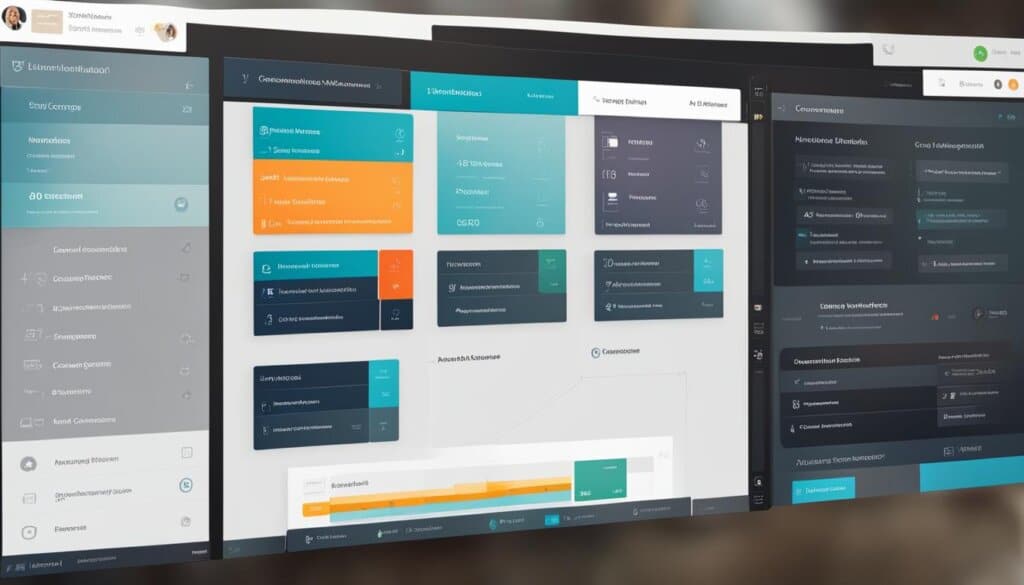Table of Contents
A learning management system (LMS) is a software application or web-based technology used in education and training to facilitate the planning, delivery, and assessment of learning processes. LMSes are widely used in educational institutions, businesses, and government agencies to improve learning outcomes, save time and resources, and enable personalized and flexible learning experiences.
The term “LMS” stands for Learning Management Systems, and it refers to a platform that consists of two main components: a server that performs the core functions and a user interface (UI) that allows instructors, students, and administrators to interact with the system. Through LMSes, educators can create and manage digital courses, deliver engaging content, track student progress, and provide timely feedback. Students, on the other hand, can access course materials, complete assignments, participate in discussions, and collaborate with peers online.
Popular LMS platforms include Moodle, Blackboard Learn, and Schoology Learning. These systems offer a range of features and capabilities to support effective teaching and learning. With an LMS, educators can incorporate multimedia content, interactive assessments, and discussion forums into their courses. They can also monitor learners’ progress, generate reports, and analyze data to gain insights into students’ performance and identify areas for improvement.
In summary, LMSes play a crucial role in modern education by providing a digital infrastructure for educational institutions and organizations. They streamline teaching and learning processes, enhance collaboration and communication, and empower learners with accessible and personalized education.
What Are Learning Management Systems Used For?
Learning management systems (LMSes) have a wide range of applications and benefits within educational institutions, businesses, and government agencies. Let’s explore some of the key uses of LMSes:
1. Knowledge Management
An LMS enables organizations to efficiently gather, organize, share, and analyze knowledge resources. It serves as a central repository for storing and accessing important information, such as training materials, best practices, and reference documents. By effectively managing knowledge, organizations can enhance collaboration, improve decision-making, and foster continuous learning.
2. Employee Training and Onboarding
LMSes play a crucial role in employee training and onboarding processes. They provide a platform for new hires to access relevant training materials, complete interactive e-learning modules, and participate in virtual classrooms. LMSes enable organizations to deliver consistent training experiences, monitor progress, and gather feedback. This ensures that employees acquire the necessary skills and knowledge to excel in their roles.
3. Sales Training
LMSes are widely utilized for sales training to enhance employees’ product knowledge, selling techniques, and customer interaction skills. Through interactive modules, simulations, and assessments, sales professionals can improve their understanding of products, sales processes, and customer needs. LMSes enable personalized and on-demand training, empowering sales teams to perform at their best.
4. Blended Learning
Blended learning approaches, which combine traditional classroom teaching with online learning tools, are made possible by LMSes. These systems support the delivery and management of digital learning materials, discussion forums, and multimedia resources. By blending in-person instruction with flexible online components, LMSes create more dynamic and personalized learning experiences.
Learning management systems offer a holistic solution for knowledge management, employee training, sales enablement, and blended learning. They streamline processes, foster collaboration, and empower organizations to optimize their learning and development initiatives.
How Do Learning Management Systems Work?
A learning management system (LMS) is a powerful tool that functions as a centralized repository for learning content, providing a wide range of features and technologies to enhance the learning experience. Let’s explore the key aspects of LMS functionality and how it works.
Responsive Design for Access Anywhere, Anytime
One of the standout features of LMS platforms is their responsive design, ensuring that users can access the system from different devices such as computers, tablets, and smartphones. This flexibility enables learners to engage with the LMS and access their learning materials whenever and wherever it’s convenient for them.
The user interface (UI) of an LMS is carefully designed to be intuitive and user-friendly, making it easy for instructors, students, and administrators to navigate through the system. With a user-friendly interface, users can easily find the information and tools they need, fostering a smooth learning experience and alignment with the organization’s goals.
Reports and Analytics Tools for Enhanced Insights
LMSes offer robust reports and analytics tools that provide valuable insights into the learning progress of students and the overall effectiveness of online training initiatives. By tracking learning outcomes, identifying knowledge gaps, and analyzing engagement metrics, administrators and instructors can continuously improve their courses and tailor learning experiences to meet the needs of their learners.
Content Management Capabilities for Efficient Organization
Effective content management is a vital aspect of any LMS. With content management capabilities, administrators and instructors can easily manage course catalogs, create targeted learning experiences, and ensure content interoperability and integration. This allows for efficient organization and delivery of learning materials, making it seamless for learners to access and engage with the content.
Support Services for Collaborative Learning
LMS platforms provide a range of support services to facilitate collaborative learning. Online discussion boards encourage interaction and knowledge-sharing among learners, while certification and compliance support ensure that learners meet necessary requirements. Additionally, LMSes may offer social learning capabilities, gamification features, automation of tasks, and multilingual support to further enhance the learning experience.

Overall, learning management systems offer a comprehensive suite of tools and features that empower organizations to deliver effective and engaging online training. From responsive design and user-friendly interfaces to robust reports and analytics, content management capabilities, and collaborative learning support, LMSes play a crucial role in transforming education and training.
Types of LMS Deployments and Payment Options
Learning management systems (LMS) offer various deployment options and payment models to suit the needs of different organizations and institutions. Understanding these options can help you make an informed decision when selecting an LMS for your learning and training initiatives.
One popular deployment option is a cloud-based LMS. With a cloud-based LMS, the software is hosted on the cloud, allowing users to access the system via the internet. This type of deployment follows a software as a service (SaaS) model, providing convenience and flexibility for both administrators and learners.
Alternatively, organizations can opt for a self-hosted LMS. In this case, the LMS software is downloaded and installed on the organization’s own servers. Self-hosted LMSes offer more control and customization options, but they require ongoing maintenance and technical expertise to ensure smooth operation.
Another option is a third-party hosted LMS. With this type of deployment, the LMS is hosted by an external organization, either in public clouds or private data centers. This option is suitable for organizations that want to offload the technical responsibilities of hosting and managing an LMS.
In terms of payment models, LMSes offer various options to accommodate different budgets and requirements. Some LMS providers offer freemium models, where basic features are available for free, allowing organizations to try out the LMS before committing to a paid plan. Subscription models are also common, with recurring fees based on the number of users or specific features. Alternatively, organizations can choose licensing models, which involve annual or one-time fees that grant access to the LMS. Additionally, there are open-source LMS options that do not incur any cost, but require technical expertise to set up and customize.
FAQ
What does LMS mean in education?
LMS stands for Learning Management Systems. It is a software application or web-based technology used in education and training to facilitate the planning, delivery, and assessment of learning processes.
What are learning management systems used for?
Learning management systems have a wide range of applications. They are used for knowledge management, employee training, onboarding, sales training, and blended learning.
How do learning management systems work?
Learning management systems function as centralized repositories for learning content. They have responsive design, user-friendly interfaces, reports and analytics tools, and content management capabilities.
What are the types of LMS deployments and payment options?
Learning management systems can be deployed as cloud-based LMSes, self-hosted LMSes, or third-party hosted LMSes. They have various payment options, including freemium models, subscription models, licensing models, and open-source options.













